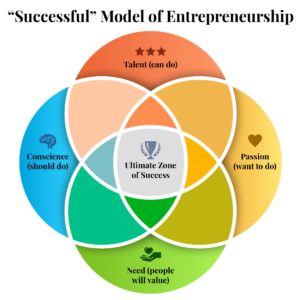Topic 2: “Successful” Model of Entrepreneurship
The figure below shows what I have termed the “Successful Model of Entrepreneurship,” adapted from Stephen R. Covey’s 8th Habit: From Effectiveness to Greatness. This model begins with the talent of the entrepreneur, which highlights what the entrepreneur is able to do. A great deal of experience, expertise, and various other characteristics are needed to engage in entrepreneurial activity, and this often guides entrepreneurs to pursue the types of activities for which they are most suited. Although entrepreneurs could always learn about areas for which they have no talent and experience, those who have a background in a particular area of interest tend to be better positioned to recognize problems to be solved and creative ways to solve them. This unique foundation can form the basis of a competitive advantage when tackling important problems to solve.

After talent comes passion, or what the entrepreneur truly wants to do. Passion is often necessary to keep the entrepreneur engaged and willing to sacrifice what is necessary to make an entrepreneurial endeavor successful. Passion and interest can also help increase the attention paid to issues related to the entrepreneurial idea, as people tend to notice what’s happening around topics important to them. Usually talent and passion combine to form our hobbies and interests, but this rarely becomes the foundation for an occupation without the next element of the model.
Next comes need, which encapsulates market demand for the particular solution the entrepreneur is intending to provide. Without need, no matter what solution the entrepreneur comes up with or how brilliant it is, the entrepreneurial endeavor is likely to fail. Sometimes “need” can be replaced by what the market “wants,” as not all successful products or services can be appropriately classified as a “need.” Either way market demand is necessary to ensure the entrepreneurial idea becomes a successful business endeavor.
Finally, the model suggests the importance of conscience, or whether or not the entrepreneur should engage in such activity at all. Although the idea of ethics, and even legality, can be a matter of perception, entrepreneurial activity that may be questionable from an ethical or legal perspective (such as price gouging during a crisis or misrepresenting a product’s or service’s capabilities) is not sustainable. The weight on one’s mind and heart of engaging in activities one shouldn’t be can interfere with long-term health and happiness.

Reflection Question: How do you define success? Write your answer in your Learning Journal.
At the intersection of all of these elements is what I call the “Ultimate Zone of Success.” In this context success is not limited merely to financial performance but also overall happiness and satisfaction within all areas of life. When all of these areas are aligned, the likelihood of success and happiness is greatly increased. This is similar to the Japanese concept of “ikigai” (reason for being) but with more of an emphasis on entrepreneurial activity. For example, ikigai separates what people need and what people will pay for into one circle, excluding the conscience aspect of the Successful Model of Entrepreneurship.
Application Activity: Personal Successful Model of Entrepreneurship
What elements of your life do you think exist at the center of the Successful Model of Entrepreneurship? Begin by answering the following questions in your Learning Journal.
- What are some of your more developed talents, experience, or expertise?
- What are some of your passions?
- What is something you can provide that is valued by the market?
- Do any legal, moral, or ethical difficulties exist with the above-mentioned activities?
- How can these areas overlap to help you achieve your own idea of success?

Seinfeld Sensei Application
George was frustrated with his boss, and his desire for autonomy and independence caused him to pursue other options.
Season 2, Episode 7 “The Revenge” (3:33)
George did a fantastic job with the first two sections of the Successful Model of Entrepreneurship by initially identifying areas in which he had some talent and passion. Jerry, as a loyal and helpful friend, aided George in identifying obstacles that might inhibit him from pursuing these talents and passions as occupations, since the market might not value George’s potential contributions. So even though George had many things he was interested in doing, these may not have aligned with what he could do and was qualified to do, nor with what others might have valued.

